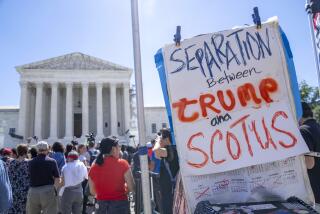Experts Can’t Agree on What Is an Impeachable Offense
- Share via
WASHINGTON — Abuse of power is such a legally vague term that almost no one could be convicted of it in court. Yet abuse of power was the basis of an article of impeachment against President Nixon and is believed to be a charge leveled against President Clinton in the soon-to-be-released report by independent counsel Kenneth W. Starr.
Even though the Constitution speaks of “treason, bribery or other high crimes and misdemeanors” as grounds for impeachment, accusations against a chief executive need not even be criminal offenses because, according to legal scholars, impeachment of a president is a hybrid process mixing politics and policy with the law.
“Abuse of power can be any outrageous, abusive conduct or any behavior that is inconsistent with the high office of president, even noncriminal conduct,” said Jonathan Turley, a law professor at George Washington University.
But Turley, a former Justice Department official and outspoken Clinton critic, added that Starr surely has included felonious conduct as well in his report to Congress, crimes such as perjury, witness tampering and obstruction of justice.
While Clinton’s supporters have argued that Congress should not dwell on lurid details of his sexual encounters with Monica S. Lewinsky, a relationship both have acknowledged, Turley contended that “only the details will reveal whether perjury was committed by Clinton.”
“Starr’s obligation is to convey to Congress every criminal act this president may have committed,” he said.
The wide latitude for impeachable offenses is deeply rooted in American history. Scholars say that those who wrote the Constitution believed they needed a mechanism, as James Madison phrased it, for “defending the community against the incapacity, negligence or perfidy” of the nation’s highest official. But neither did they wish to make a president subject to removal because of congressional pique or whim.
Only once in U.S. history, in 1868, has a president been impeached by the House and gone to trial in the Senate. But President Andrew Johnson was acquitted when the Senate fell one vote shy of the necessary two-thirds majority for his conviction in a dispute involving post-Civil War reconstruction of the South.
Legal experts who have studied the legislative history of impeachment say that Rep. Gerald R. Ford, four years before he succeeded Nixon as president, reaffirmed the broad base for removing high officials from office when, as Republican leader in the House, he led an abortive move to impeach Supreme Court Justice William O. Douglas.
“An impeachable offense is whatever a majority of the House of Representatives considers it to be at a given moment in history,” Ford intoned--a remark often cited by scholars.
Before Nixon’s resignation in August 1974--in the face of certain impeachment by the House and probable conviction by the Senate--his personal attorney, James St. Clair, argued that a chief executive may be impeached “only for indictable crimes clearly set forth in the Constitution.”
Members of the House Judiciary Committee, however, did not agree. Among three articles of impeachment lodged against Nixon was an abuse-of-power allegation: he was accused of “using the powers of his high office” to block the FBI’s investigation of the 1972 Watergate break-in.
In Clinton’s case, Robert J. Giuffra, a Republican counsel on the Senate Whitewater Committee two years ago, said he believes that Congress, based on evidence submitted by Starr, “might also cite the president’s alleged misuse of the White House counsel’s office to monitor or even influence grand jury witnesses, or his alleged abuse of the Secret Service, considering what he put those agents through in having to testify.”
In another non-felony charge, Nixon was cited for making “false or misleading public statements for the purpose of deceiving the people of the United States.”
Some Clinton critics see a parallel in that charge with the president’s finger-wagging insistence on national television last January that “I did not have sexual relations with that woman, Miss Lewinsky,” and his continued deception of his Cabinet, his staff, his family and the country over the next seven months.
Balancing these concerns, however, some legal experts argue that even if a president committed a felony, he should escape impeachment if his crime was not closely related to the performance of his official duties.
For example, Yale Law School professor Charles L. Black Jr., in a book he wrote around the time of Nixon’s troubles, cited two hypothetical examples that now seem close to the accusations facing Clinton. He speculated about a president who brought an underage female across a state line for immoral purposes, in violation of the federal Mann Act, or who illegally helped a young White House intern conceal possession of marijuana.
Black said that these would be “preposterous” reasons for removing a president from office. Rather, impeachment should be reserved for “extremely serious” offenses that “in some way corrupt or subvert the political and governmental process,” Black said.
(BEGIN TEXT OF INFOBOX / INFOGRAPHIC)
Where the Case Stands
(1) Wednesday: Report with the independent counsel’s evidence against President Clinton is delivered to the Speaker of the House of Representatives.
(2) Thursday: On Thursday, House Rules Committee asks House to approve a resolution that authorizes Judiciary Committee to receive the material and establishes procedures for conducting an initial investigation.
(3) Today: Resolution expected to be sent to the floor for a vote by the full House. Portions of report will then be released to public.
Sources: Times staff reports; AP research
More to Read
Sign up for Essential California
The most important California stories and recommendations in your inbox every morning.
You may occasionally receive promotional content from the Los Angeles Times.













